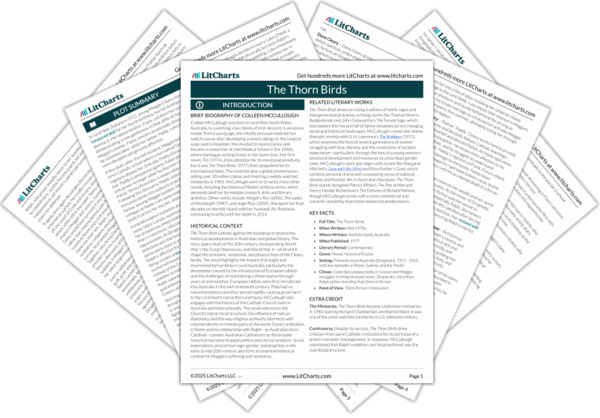Meggie’s doll, Agnes, symbolizes the fragility of girlhood and the early erasure of Meggie’s identity in a male-dominated world. At the start of the novel, Fiona gives Meggie the doll as a birthday present—Meggie’s first and only object that belongs solely to her. But Meggie’s brothers quickly destroy Agnes, marking the beginning of Meggie’s lifelong pattern of quiet endurance, emotional dispossession, and coerced selflessness. The loss of the doll seems small in material terms, but it carries massive symbolic weight: not only does it confirm that Meggie’s wants will never matter as much as others’ needs, but it also shows her that anything tender or private in her will always attract intrusion and harm. The destruction of Agnes foreshadows Meggie’s marriage to Luke, who treats her as an object passed between hands—valued for her utility, not her feelings. Like the doll, Meggie endures handling, bruising, and abandonment. But unlike Agnes, Meggie survives. Her memory of the doll preserves the innocence no one allowed her to keep, and its fate points forward to the emotional violence that shapes her path toward womanhood.
Agnes (Meggie’s Doll) Quotes in The Thorn Birds
She was yanking inexpertly at a large knot when the dreadful thing happened. Off came the hair, all of it, dangling in a tousled clump from the teeth of the comb. Above Agnes’s smooth broad brow there was nothing; no head, no bald skull. Just an awful, yawning hole. Shivering in terror, Meggie leaned forward to peer inside the doll’s cranium. The inverted contours of cheeks and chin showed dimly, light glittered between the parted lips with their teeth a black, animal silhouette, and above all this were Agnes’s eyes, two horrible clicking balls speared by a wire rod that cruelly pierced her head.










